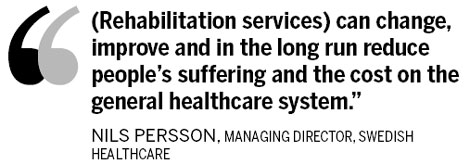Blending East and West practices to better care for people
Updated: 2013-07-15 07:25
By Alexander Bloom (China Daily)
|
|||||||||||

Lack of trained managers and application of technical skills are the main obstacles hindering progress in China's increasingly burdened rehabilitation and nursing sector, says Nils Persson, managing director of Swedish Healthcare, a training provider and consultancy.
Persson believes that these issues are mainly because of a reluctance to see the benefits of investing in training and knowledge and recognizing that technical know-how rather than just equipment are of value to organizations.
"There is a great belief in hardware and not such a great belief in software but I think this will change, " says Persson, adding that his organization would look to be at the forefront of change.
Since its foundation in 1989, Swedish Healthcare has taken part in the development of several nursing and rehabilitation homes in Sweden and also provided training and competence courses for more than 2,000 medical professionals and international students in more than 20 countries.
With the Beijing-based Intech Rehabilitation Hospital as a partner, Swedish Healthcare has recently designed a course that focuses on the management of startup nursing homes and rehabilitation clinics for the Chinese market. One course was attended by 24 medical professionals across China.
The course covered key topics including how to manage the financial risks of running clinics, diagnosis training and handling personal patient care. Although currently Swedish Healthcare only provides theoretical training in China, it plans to also offer clinical training for care workers in the future.
Swedish Healthcare's expertise is rooted in Sweden's globally renowned healthcare system, which introduced universal health coverage in 1955, making it one of the first countries in the world to do so. In comparison, China aims to achieve universal coverage by 2020.
Turning to China's healthcare sector, Persson sees the improvement of rehabilitation services as one way to reduce the financial burden of illness on the system.
"(Rehabilitation services) can change, improve and in the long run reduce people's suffering and the cost on the general healthcare system," Persson says.
"They could change views on how to rehabilitate individuals and increase knowledge for providing more efficient healthcare."
Persson says one way to improve rehabilitation services in China is to adapt Western practices, to facilitate this process, his team has prepared case studies based on several rehabilitation centers built in Sweden. They use them in Chinese classrooms to train medical professionals.
During the lessons, the Chinese students are encouraged to discuss how the Swedish case studies can be applied in China's context.
Main areas of focus within these case studies are accessibility, providing appropriate technology in rehabilitation facilities and looking after vulnerable patients such as stroke victims, he says.
Persson says that one group of patients demanding increasing attention in China's rehabilitation field is elderly citizens because they are more vulnerable to the types of injury that require rehabilitation services.
As China has an ageing population, the government has already invested heavily in elderly care, alternatively known as geriatric care, but Persson says more needs to be done. "I think the next step is how to start organizing homecare services, providing nursing care at home for elderly people whose children have moved away and so on," he says.
Persson says one solution to the problems of rehabilitation and geriatric care is improving primary care provision, which he believes is not yet adequate in China.
He says patients with "a need for minor and simpler treatment" should have their needs met quickly in accessible primary care facilities rather than large emergency hospitals.
The need for primary care can and should be fulfilled through the establishment of more medical centers. Such centers should be accessible, provide preventative healthcare services such as check-ups and yearly examinations and also deliver minor treatments, he says.
At the same time, Persson believes that healthcare in China is rapidly changing, and Western involvement may be coming to an end, although currently contributions are still needed when it comes to human resources and training.
"I think that acknowledgment, recognition and development of human resources will be the main expertise that the West can provide to change the view of human resources within Chinese healthcare management and rehabilitation," Persson says.
China Daily
(China Daily 07/15/2013 page16)
Today's Top News
Going private in healthcare 'is the future'
Snowden says he won't release harmful US data
More foreign companies involved in IPR cases
Local govts face financing woes
HK to lift controls on baby formula
Zimmerman not guilty
Largest vessel visits Indonesia
Urumqi residents hand in weapons
Hot Topics
Lunar probe , China growth forecasts, Emission rules get tougher, China seen through 'colored lens', International board,
Editor's Picks

|

|

|

|

|

|





